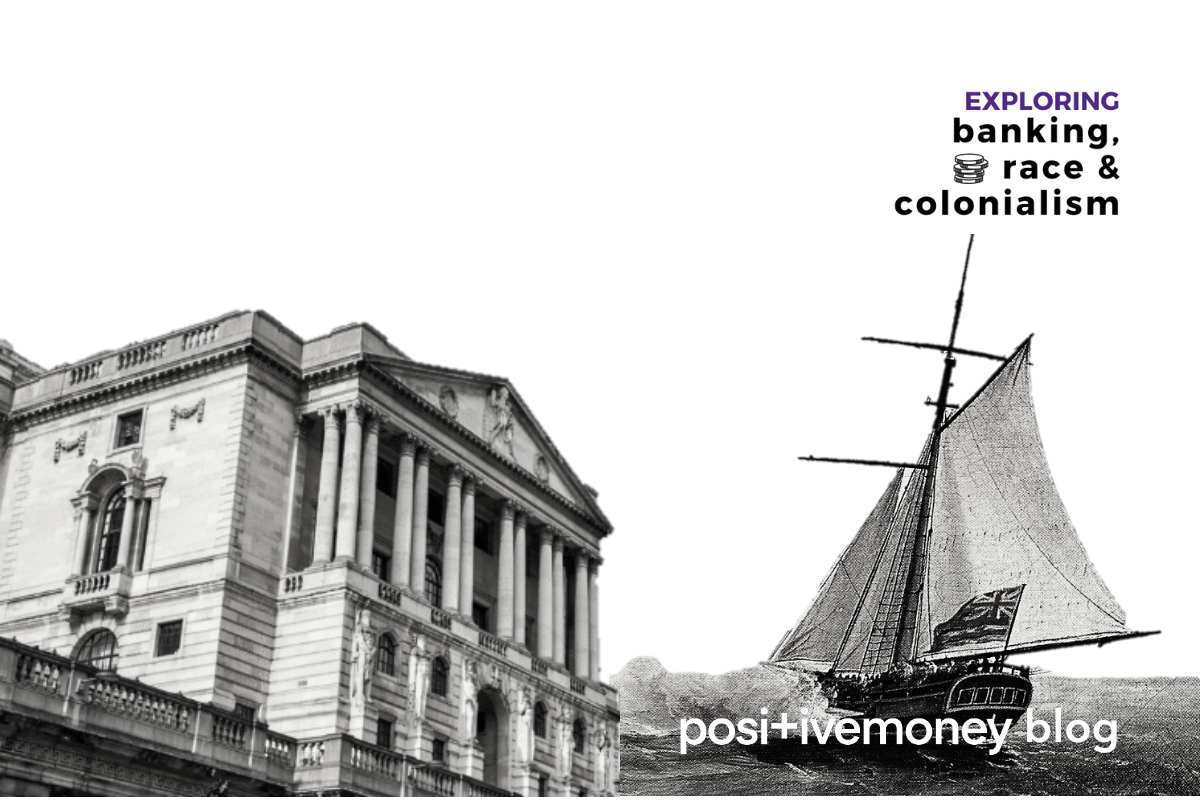
UKEU
18 February 2026
The Bank of England recently issued an apology for its ties with the slave trade. But notably, while accepting that former directors and members did profit from slavery, there was an effort to maintain the innocence of the institution. This demands a deeper look into the role of the Bank in driving and benefitting from the slave trade and colonialism, to better inform what actions are needed to address the racial inequities that persist in the UK today.
Days after Colston’s statue was pulled down in Bristol, the Bank of England and a handful of other financial institutions issued public apologies for their respective ties to the slave trade. But as many have articulated before us: an apology is not enough. The Bank of England stressed that the institution itself was not responsible, stating: “As an institution, the Bank of England was never itself directly involved in the slave trade, but is aware of some inexcusable connections involving former governors and directors and apologises for them.” This statement carefully separates the Bank of England staff and leaders, who amassed large fortunes through the slave trade, from the institution itself.
Whilst the Bank has made positive steps; promising to bring down all images on display of former directors with links to the slave trade and calling for compulsory ethnicity pay gap reporting, these measures fall far short of the concrete actions which are needed to address the UK’s glaring racial wealth gap. As American historian Ibram Kendi argues, “the origins of racism cannot be separated from the origins of capitalism.” The Bank of England, along with other major financial institutions, played a critical role in driving both the British transatlantic slave trade and colonial conquests of large swathes of the world. These are the historical roots of racial inequalities that permeate the everyday lives of Black, Asian and Minority Ethnic (BAME) communities, and all vulnerable and disadvantaged people. Building this thinking into how our current institutions make policy decisions will help to actively reshape the economy into one that benefits us all.
The Bank of England was established in 1694 and had a fundamental role to play in enabling Britain to increase its role in the slave trade by underpinning the development of long-term commercial credit, which helped to finance the slave trade and the ensuing industrial revolution. The Bank helped to stabilise our national finances which enabled the State to engage in multiple wars during the 18th century – wars which were in large part aimed at securing slave colonies. By the beginning of the 19th century, Britain was the leading slave trading nation, responsible for 40% of the movement of over 3 million enslaved Africans across the Atlantic.
However, the immediate profits from trade with sugar and tobacco plantations in the West Indies are only part of the story. Rather it’s the long-term investment of those profits that laid the foundations for the racial wealth inequalities that persist today. Sustained wealth accumulation from the slave trade and British colonies, fuelled investments in a range of industries such as shipbuilding, banking, insurance and guns. It was the development of financial institutions, like the Bank of England, which were integral to securing this wealth and driving innovations in the types of long term credit instruments that the slave trade depended upon. Then, as now, it was impossible to divorce one’s wealth from the broader institutions of which one was a part. As Nick Draper, previous Director of UCL’s Legacies of British Slave-Ownership Project, notes: even abolitionist bankers – those campaigning against the slave trade – held mortgages and other financial assets secured on plantation estates.
In spite of overwhelming evidence, the role of slavery in fuelling British capitalism remains contested in mainstream narratives. This upholds a common contradiction where the UK prides itself for abolition, yet denies any benefits accrued from being a major player in the slave trade. It cannot be stressed enough: major UK cities, ports, banks, universities and financial institutions, were built using profits from the slave trade. Furthermore, slavery did not end with abolition. The process was long and arduous, with all slaves forced to work for free for an additional 6 years to help cover the cost of compensation . 46,000 British slave owners were handed a total of £20 million – equivalent to £17 billion today – as part of the 1835 Slavery Abolition Act. This amounted to the biggest bailout in UK history prior to the 2008 crash.
Dr Hilary Beckles, Chairman of the regional alliance for Caribbean countries (CARICOM), has tirelessly argued for reparations as a form of “Marshall Plan” and for the cancellation of national debts for countries that were devastated by the slave trade. Others have called for climate reparations for the Global South, recognizing the disproportionate responsibility colonial powers have had in greenhouse gas emissions. British politicians have consistently denied calls for reparations, yet they fail to provide serious alternative policy proposals to redress stark racial inequities across the UK and globally.
Recognition and compensation to those countries and descendents of those who suffered is long overdue. What form this takes should be decided on the basis of dialogue and consent from those most affected. At the same time, we must deepen our understanding of how capitalism, and in particular the UK’s financial sector, was built on a legacy of slavery and labour exploitation. These are the roots of the racialised capitalism we see today, not only with the widespread use of cheap and precarious labour across international supply chains, but also here at home, in the garment sweatshops of Leicester and the rise of the gig economy.
The Bank of England’s mission statement is “to promote the good of the people of the United Kingdom by maintaining monetary and financial stability.” So a natural follow up question should be: what parts of the population do its policies neglect? The Coronavirus crisis has proved that economic and social inequities in the UK are not haphazard and random, but ordered and historical. People from BAME backgrounds are at a higher risk of death from Covid-19. Recent research by the Runnymede Trust shows that stark racial inequalities persist along many dimensions, including levels of unemployment, pay gaps, and disproportionate rates of poverty. Yet, the Bank has failed to design its policies in a way that reflects this knowledge and is attentive to it’s own history of slavery and racism.
Further research needs to be done on the connections between the Bank of England and the slave trade, and the Bank can start by paying for more of its archives to be published. At the intersection of regional inequality and ethnic minorities, the Bank of England should look closer at the Royal Society of the Art’s recent recommendation for prioritising community banks and preventing branch closures where they are needed most. We have also called on the Bank of England to diversify their committee memberships to include people from BAME backgrounds as well as civil society, to better inform policy decisions to support the needs of marginalised groups. The US Federal Reserve is increasingly focusing on racial justice, it’s time for the Bank of England to follow suit. It must commit greater research capacity to learn how its decisions over quantitative easing, interest rates, and even it’s newly founded Covid Corporate Financing Facility (CCFF), are affecting BAME communities, ignoring this reality is no longer an option.
This post is the first in our Exploring Banking, Race and Colonialism blog series. Click here to read other posts in the series.
